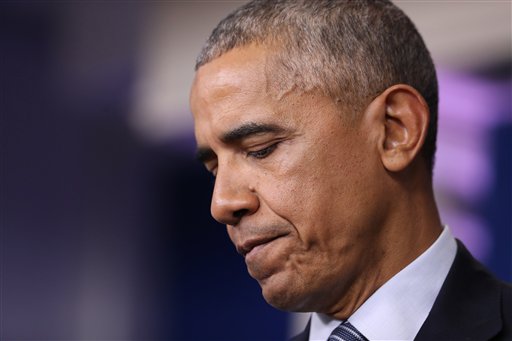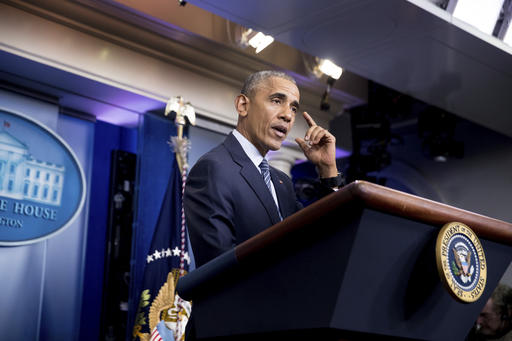How President Obama really failed the coalfields
November 15, 2016 by Ken Ward Jr.
President Barack Obama listens to questions during a news conference in the Brady press briefing room at the White House in Washington, Monday, Nov. 14, 2016. (AP Photo/Manuel Balce Ceneta)
Yesterday’s post, “President-elect Trump’s coal con,” got a fair amount of attention and it is indeed a topic that deserves to be talked about by everybody who cares about the coalfields and about our state’s politics.
But it’s worth remembering that the political climate at any place at any particular time doesn’t just materialize out of thin air. The climate is created, by things that human beings (like candidates, party chairs, the media, votes) can control and by things they can’t control.
In West Virginia, the political climate didn’t just suddenly become anti-Obama and anti-EPA to the extent that it has become so. It took years of hard work by Republican activists, career campaign consultants, and coal industry public relations people. The truth is, though, that many Democrats — I’m looking at you, Sen. Joe Manchin, haven’t forgotten that awful ad where you shot the cap-and-trade bill — gave the industry and the Republicans plenty of help along the way.
Still, if you’re one of those West Virginia Democrats who wants to blame various election results on those awful people from the national party you belong to, it is worth trying to think about what really you should be focused on in that regard. Really, what that all goes back to is a little statement buried in a U.S. Environmental Protection Agency press release way, way back in 2009. At the time, EPA was announcing a bit of a crackdown (it was never really much of a crackdown) on mountaintop removal coal-mining. Here’s what it said:
Federal agencies will work in coordination with appropriate regional, state and local entities to help diversify and strengthen the Appalachian regional economy and promote the health and welfare of Appalachian communities.
Sounds great, right? The problem is, the Obama administration didn’t really get moving with a broad and detailed plan for any of that sort of thing until about six years later — in 2015, President Obama’s next-to-last-year in office. In 2015 and again this year, the White House included a major coalfield aid package in its budget proposal to Congress.

Would announcing the Power Plus Plan a few years earlier have totally changed politics, have suddenly made President Obama incredibly popular in Logan County? That’s not what I’m suggesting at all.
But it’s not like some within the Democratic party weren’t pushing for this sort of initiative long before the White House acted. Two years ago, former state Democratic co-chairman Chris Regan makes this reasonable point in a blog post:
Democrats must make the case for a diversified economy honestly, forthrightly and without fear of being painted as an “enemy of coal.” Coal remains a significant, but shrinking part of the economic picture – and much of coal’s decline relates to market forces beyond the control of even the federal government, let alone the legislature
A strong push from the national party would have perhaps at least given West Virginia Democrats something to respond more forcefully to the constant attacks about a “war on coal.”
Still, remember that President Obama did propose some of the parts of the Power Plus Plan — primarily changes to free up more money for job-creating abandoned mine cleanups — for several years (see here, here and here), only to get little support for the idea from Appalachian Democrats.
It’s hard for me not to think, though, of what might have happened had President Obama proposed a more complete coalfields aid plan back before Sen. Robert C. Byrd died, or after Obama himself visited West Virginia to eulogize the coal miners who died at Upper Big Branch, or even put something even marginally more concrete together back when then-EPA Administrator Lisa Jackson promised such an effort.
Maybe there’s a little bit of a lesson in there for the Democrats, both here and in Washington.

 Subscribe to the Coal Tattoo
Subscribe to the Coal Tattoo
